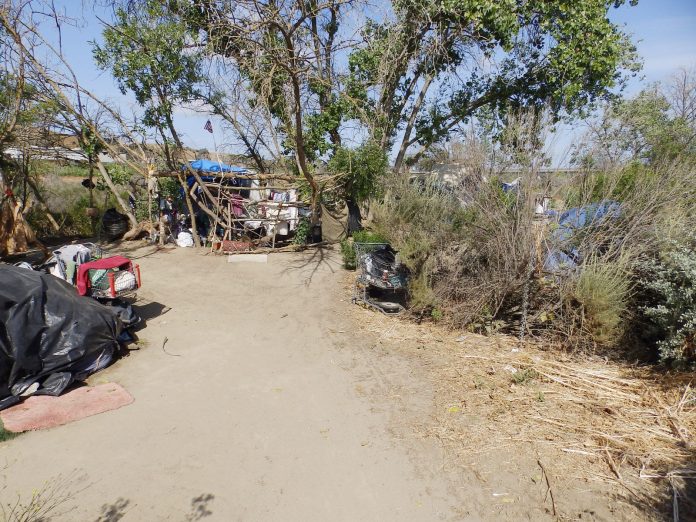
Despite no related agenda items listed on two issues—a possible closure of Nash Road near the high school and homeless residents living along the San Benito River bed—county supervisors Tuesday held extended talks on the topics.
The issues came up during consecutive department head and board announcements at the outset of Tuesday’s meeting.
Routinely, department heads and supervisors will offer basic announcements on his or her activities since prior meetings, such as recounting conferences or committee gatherings they had attended. The county regularly lists those portions of board meetings on agendas under “Department Head Announcements” or “Board Announcements” with no further descriptions.
But without listing specific topics on a meeting agenda—for discussion or action—holding a related conversation among supervisors could constitute a violation of the state’s Brown Act governing open meetings of elected boards.
“I think you might have a Brown Act violation there because they deliberated on something without agendizing it,” said Nikki Moore, staff attorney and legislative advocate for the California Newspaper Publishers Association.
Here is a sampling of comments from supervisors on the two non-agendized topics during department head and board announcements:
Supervisor Robert Rivas responded to last week’s criticism from Councilman Victor Gomez alleging a lack of county progress on a possible Nash Road closure.
“Well, what the heck have we been working toward for the last two or three years?” said Rivas, then asking to have an item agendized inviting the city manager to explain Hollister officials’ stance.
Gomez, for one, at the joint meeting was instead a proponent of a pedestrian bridge solution, something school board Trustee Bill Tiffany at the same gathering called “way too expensive” and “prohibitive in cost” due to Americans with Disabilities Act requirements.
Gomez at the meeting last week also said he didn’t trust the county to build the bypass road anytime soon.
“Right now, no one is giving me a solution, except, ‘Hey let’s shove all the vehicles into the neighborhoods,’” Gomez said at the meeting.
Both Rivas, a San Benito High School employee, and Supervisor Anthony Botelho in their Tuesday comments referenced prior agreements made between district and county officials.
“We walked out of there with an agreement,” Botelho said regarding a prior meeting. “We had a timeline. We agreed to build that road.”
Supervisors didn’t limit their open remarks to the Nash Road issue and moved on to discussing views on the homeless matter, also missing from the meeting agenda. Supervisor Margie Barrios said she had visited the growing riverbank encampment on the west side with Hollister Mayor Ignacio Velazquez and contended that most garbage there had been present for a long time. She suggested possibly installing a gate.
“We are working as a county to really address the issue,” Barrios said in the meeting. “There are so many facets to addressing the homeless.”
Rivas chimed in as well, on the tiny home concept pushed by Velazquez. The idea involves subsidizing miniature homes, outfitted with amenities, for homeless residents as transitional shelter.
“I’m not for tiny homes,” Rivas said at the meeting. “In my opinion, I don’t think it works for San Benito County.”
Those comments all came during announcements. Merely listing “Department Head Announcements” would not protect the county from extended discussions or actions—and Brown Act potential violations—which arise out of those talks, Moore said.
“There’s nothing in that description (Department Head Announcements) that would allow you to know a discussion was taking place,” Moore said.
It’s not the first time the notion of transparency has played a role in the Nash Road closure issue. Hollister council members surprised county and high school officials in January by voting 3-2 against plans to temporarily close a portion of Nash Road—a move needing approval from all three government boards—without informing officials with the two other entities about the consideration before that meeting.
The city’s rejection and subsequent criticism of the county last week became central in the views shared by supervisors after the initial department head announcement Tuesday. That announcement came from Sara Fontanos, a management analyst. She had been reporting back on last week’s meeting involving the city and high school district.
After Tuesday’s county board meeting, when informed of a possible Brown Act issue, supervisors had varying responses.
“There was no violation of the Brown Act,” Barrios told the Free Lance. “We did not take action.”
Rivas said he wasn’t sure if it was a Brown Act violation, but noted, “This is pretty common for our meetings.”
Rivas said on the homeless issue, he had been planning to talk about the same matter in his board announcement, following the department head announcements.
Botelho had a similar response, mentioning he had been planning to address the homeless issue in his board announcement.
“I think everybody is very deeply concerned about it,” Botelho told the Free Lance about the homeless problem.
Botelho said he didn’t think there were Brown Act violations because there was no action taken.
He added about the staff, though: “We’re lucky to have the people we’ve got, but they’re relatively new.”
Supervisor Jaime De La Cruz, who spoke just briefly during announcements, said officials have to rely on staff members to guide them.
“I’ve got to talk to our county counsel,” De La Cruz said. “I hope he guides us through those topics. I don’t know if that (a violation) happened or not. We want to make sure we allow the public access to input.”
He later went on: “It’s such a passionate issue. Maybe we need to make sure we safeguard what we can discuss and not discuss.”
Supervisor Jerry Muenzer could not be reached immediately.
Penalties for Brown Act violations
Penalties and remedies for violating the Brown Act include criminal misdemeanor penalties for members of the violating board. Charges are filed when a member attends a meeting where a violation occurred and “where the member intends to deprive the public of information to which the member knows or has reason to know the public is entitled,” according to the act. Civil remedies include an injunction on the board to stop violations or to prevent violations. Also all actions can be voided.
Brown Act Excerpt:
At least 72 hours prior to a regular meeting, an agenda must be posted which contains a brief general description of each item to be transacted or discussed at the meeting.
Source: Brown Act









